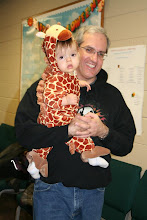I just received a couple of emails from my mother. Turns out they did put her dog, Haley, to sleep yesterday. And since the little girl has been spoiled rotten for the last 8 years, her passing has really shaken the family up. My brother told me the other day that he hasn't cried in a very long time, even when he was in pain from a knee injury and subsequent surgery, but for this he has cried so much that he doesn't think he will have tears available for the next decade. Or something to that effect.
At some point during the conversations my mother and I had in the days leading up to her decision to put Haley to sleep, I mentioned how One Ring and I had said that since we couldn't save our dog, perhaps we could save another at some point down the road. My mother's response was vehement and predcitable. She said that it had taken 20 years for her to get over the death of her first dog (which died when I was 10, by the way), and that she would never even think of getting another. I can certainly understand that feeling, and I think we've all had similar experiences.
Our natural tendency is to flee pain and rush towards pleasure. How we do that varies from person to person, but it's the reason we sit down with a half gallon of chocolate chip cookie dough ice cream (or just the cookie dough) after a relationship goes sour. It's the reason we use addictive substances or behaviors when life becomes difficult - we want to kill the pain. And it's the reason we say things like my mother did. There's no way I'm doing this again, I can't handle any more grief and sorrow.
When I first got into Buddhism, I came across this interesting concept: non-attachment. The four noble truths talk about how suffering is caused by being attached to people, places, things, and ideas. So the solution to suffering, Western logic would suggest (at least my Western logic did) is to not be attached to anything. Thing is, that's impossible. Just about every serious religious or philisophical system (or even quantum physics, for all you science nerds out there!) states that we are in fact intimately connected to everything.
Or to quote Wesley from The Princess Bride, "Life is pain. Anyone who tells you otherwise is selling something."
What non-attachment means is that we need to realize that nothing lasts forever. Nothing, not even ourselves. Our ego wants to believe that we are invulnerable, and we don't like to think about our friends, family or pets dying, but we know that they will. So will we. But that truth is in itself painful. So when we hit suffering, we run. We say that we'll never enter into a relationship again, or never have another pet, or never do this or that again. Unfortunately, though, that behavior is not the way to a healthy and non-suffering life.
When we realize that nothing lasts forever, we appreciate it more. We appreciate our experiences, our relationships, and life itself more, because we are connected to everything. Life is life, in all it's similarities to heaven and hell. The only way through it is through it, and the only way to make it through is to embrace life for what it is.
One of my favorite Zen authors, Brad Warner, had this to say about it today on his Hardcore Zen blog:Finally, I wanted to say something about attachment. I think I may have overstated the case when I said that Buddhism doesn't much value the idea of non-attachment. It does. But there is a problem when you get too attached to words like "non-attachment." What I'm seeing in America is that a lot of folks seem to view the idea of non-attachment as being the same as what we call detachment. They take the view that a good Buddhist should be almost like what they used to call a sociopath. They believe Buddhism asks us to cultivate an attitude of callous indifference and a kind of narcissistic aloofness. Very few people actually do this, of course. But the idea that Buddhism advocates this kind of attitude turns a lot of sensitive people away, and that's a shame.
The e-mail that inspired the initial piece I wrote on the subject was from a guy who wondered if his love for his wife and kid constituted an attachment that he should try to overcome. But Buddhism isn't about not loving your wife and children! The non-attachment we're talking about is a different matter entirely. It's a realistic and balanced understanding that on one hand we are, in fact, very attached to everything. We, ourselves, are not independent at all. We are an expression of the universe. We can't possibly detach ourselves from that which we encounter. At the same time it's the understanding that all we are attached to will one day disappear (like Philip Jose Farmer did the other day). And it's an understanding that our specific attachments and preferences hinder our appreciation of the true nature of our existence.
Hope this helps.
Friday, March 6, 2009
Death, Pain, and the Desire to Escape Reality
Subscribe to:
Post Comments (Atom)




No comments:
Post a Comment